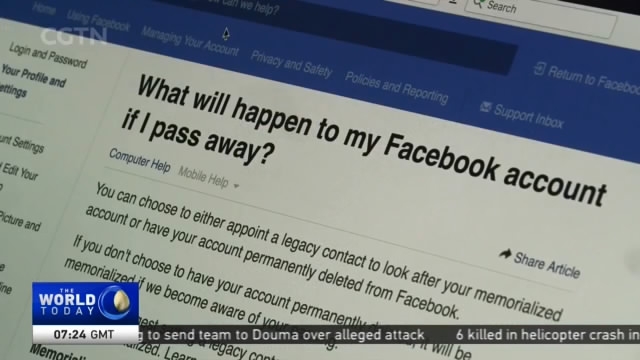
15:54, 11-Apr-2018
Digital Afterlife: Addressing data of deceased users on social media

More and more, our social media profiles help define who we are as individuals. But what happens to all that data after we die. And how is the subject of death treated on the Internet anyway? One expert in the US state of Colorado has made this issue his prime focus. CGTN's Hendrik Sybrandy reports.
Nine years ago, Jed Brubaker was scrolling through Facebook on his computer.
JED BRUBAKER, ASST. PROFESSOR UNIVERSITY OF COLORADO BOULDER "And I ran across a profile of a friend and something was just a little bit off about it."
He looked further.
JED BRUBAKER, ASST. PROFESSOR UNIVERSITY OF COLORADO BOULDER "And eventually yeah it became clear that, yes, this friend of mine had died."
He was shocked and sad and, as a computer scientist, also surprised. Facebook had continued to send reminders of her birthday and advanced her age in her profile, after her death. He decided:
JED BRUBAKER, ASST. PROFESSOR UNIVERSITY OF COLORADO BOULDER "There was a problem here. There was something that needed to be done."
Brubaker, who now teaches in the Information Science Department at the University of Colorado Boulder, began delving into the issue. Facebook contacted him. That led to Legacy Contact, a feature that allows users on the site to designate people who will care for your Facebook account and profile after you die.
HENDRIK SYBRANDY DENVER For years, we perused newspaper obituaries to find out who had died. That's much less true nowadays. As Brubaker puts it, as our lives have moved online, our deaths have as well.
JED BRUBAKER, ASST. PROFESSOR UNIVERSITY OF COLORADO BOULDER "But there's little thought put into how we should even engage that?"
We routinely post messages on the profiles of the dead, something Brubaker is studying.
AARON JIANG, PHD STUDENT UNIVERSITY OF COLORADO BOULDER "We're analyzing the things that people post to these death accounts. We're analyzing the things people are saying to the dead."
JED BRUBAKER, ASST. PROFESSOR UNIVERSITY OF COLORADO BOULDER "There's that saying that funerals are for the living. It's true for profiles after you die as well."
He's found that the deaths of celebrities often lead to emotionally intense content. Fans of those stars report:
JED BRUBAKER, ASST. PROFESSOR UNIVERSITY OF COLORADO BOULDER "Feeling quite offended and shocked as others would show up saying things like, well, people die all the time or he wasn't all that great."
One web designer, whose Facebook Year in Review featured a photo of his daughter who had recently died, coined the term algorithmic cruelty to describe the way death is handled on the Internet. Brubaker says it could use some improving.
JED BRUBAKER, ASST. PROFESSOR UNIVERSITY OF COLORADO BOULDER "And how do we design particularly algorithms and these large computational systems to be sensitive to content that deserves sensitivity?"
Perhaps, he suggests, toxic comments could be featured less prominently. There's a blind spot, he says, in social media.
JED BRUBAKER, ASST. PROFESSOR UNIVERSITY OF COLORADO BOULDER "Well, we just haven't quite figured out how to deal with that end of life portion yet."
This death guy, as he's been called, wants to make sure that inevitable part of life is handled with care, in an area where we spend a lot of time interacting. Hendrik Sybrandy, CGTN, Denver.

SITEMAP
Copyright © 2018 CGTN. Beijing ICP prepared NO.16065310-3
Copyright © 2018 CGTN. Beijing ICP prepared NO.16065310-3